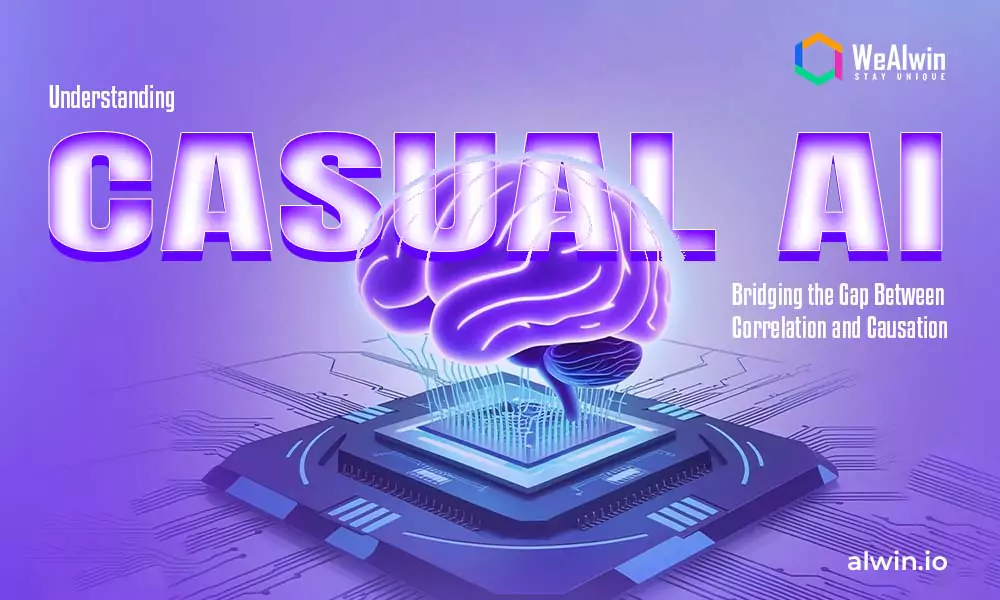Imagine a healthcare algorithm that predicts patient outcomes based solely on correlations in historical data. For white patients, higher rates of illness correlate with increased healthcare costs, making it reasonable to use costs as a predictor for future health needs.
However, the same correlation does not hold true for black patients, where higher illness rates do not lead to higher costs.
This discrepancy highlights a critical issue: relying solely on predictive models can lead to misguided conclusions when correlation is mistaken for causation.
This is where Causal AI emerges as a vital solution. By focusing on understanding the underlying cause-and-effect relationships rather than mere statistical associations, Causal AI can provide deeper insights into complex systems.
As industries increasingly turn to AI for decision-making, the need to discern causality becomes paramount. Causal AI empowers organizations to model interventions, assess their potential impacts, and ultimately make more informed decisions.
In this blog post, we will explore the principles of Causal AI, its applications across various sectors, the challenges it faces in implementation, and its future prospects.
Understanding Causal AI is essential not only for improving operational efficiencies but also for ensuring the ethical and effective use of artificial intelligence in critical areas such as healthcare, finance, and public policy.
What is Causal AI?
Causal AI is a specialized area of artificial intelligence focused on understanding cause-and-effect relationships within data. Unlike traditional AI, which identifies correlations, Causal AI seeks to uncover the underlying mechanisms that drive these relationships, enabling more informed decision-making.

Historical Context and Evolution
Judea Pearl: A key figure in Causal AI, Pearl's work laid the foundation for causal reasoning in statistics. His books, Causality and The Book of Why, highlight the importance of understanding causation for advancing AI.
Evolution: Causal AI has transitioned from theoretical concepts to practical applications, with research labs dedicated to exploring its implications in various fields.
Key Figures in Development
- Judea Pearl: Instrumental in defining the field.
- Elias Bareinboim: Notable researcher contributing to causal inference techniques.
Correlation vs. Causation
- Correlation: A statistical relationship where two variables move together but do not influence each other (e.g., ice cream sales and drowning incidents).
- Causation: A direct influence where one event leads to another (e.g., smoking leading to lung cancer).
Why is Causal AI Important?
Causal AI plays a critical role in enhancing decision-making across various sectors by addressing the limitations of traditional machine-learning approaches that rely solely on correlations.
1. Limitations of Traditional Machine Learning
Traditional machine learning models often function as "black boxes," making it difficult to interpret how decisions are made. These models primarily identify patterns and correlations in data without understanding the underlying causal relationships. As a result, they face several limitations:
- Lack of Causality: These models identify correlations but fail to establish causation. For example, they may show that increased advertising correlates with higher sales without proving that the ads caused the increase.
- Bias and Discrimination: Models trained on biased data can perpetuate inequalities, leading to suboptimal outcomes for underrepresented groups.
- Poor Generalization: Traditional models may struggle to adapt to new situations or changes in data, limiting their effectiveness.
2. Enhancing Decision-Making Processes
Causal AI improves decision-making by revealing causal relationships between variables. This enables organizations to:
- Make Informed Interventions: Understanding causal factors allows for targeted strategies that lead to desired outcomes. For instance, healthcare providers can identify effective treatments for specific patient demographics.
- Improve Predictive Accuracy: Causal models enhance forecasting by accurately predicting the effects of changes in variables.
3. Industry Implications
- Healthcare: Causal AI identifies effective treatment protocols by analyzing relationships between patient characteristics and outcomes, improving recovery rates.
- Finance: It enhances risk assessment by uncovering causal factors behind defaults and market fluctuations, leading to better risk management strategies.
- Marketing: Marketers can optimize campaigns by understanding which elements drive engagement and sales, such as promotional discounts versus product placements. For example, leveraging AI-based marketing strategies can help analyze the impact of various promotional tactics on consumer behavior, allowing marketers to refine their approaches achieve better results, and enable more effective campaign optimization.
How Causal AI Works?
Causal AI employs various methodologies to uncover and model cause-and-effect relationships within data. Here’s a technical overview of its operation:
Methodologies Used in Causal AI
- Causal Inference: This method estimates the causal effect of one variable on another, moving beyond correlation to identify direct impacts while accounting for confounding factors.
- Causal Discovery: Algorithms analyze data patterns to uncover potential causal relationships, constructing models representing these dependencies.
- Structural Causal Models: These models integrate domain expertise and are used to estimate the effects of interventions through hypothetical scenarios and counterfactual analysis.
Step-by-Step Process of Building Causal AI
- Collecting Observational Data: Gather extensive observational data that captures relevant events, behaviors, and metrics over time. This data serves as the foundation for identifying causal relationships.
- Discovering Causal Relationships: Utilize causal discovery algorithms to analyze patterns in the observational data, identifying potential causal relationships between variables.
- Building Causal Models: Construct causal models, such as Bayesian networks or structural causal models, based on the discovered relationships. These models represent the dependencies and interactions among variables.
- Incorporating Domain Expertise: Integrate insights from subject matter experts to refine the understanding of causal mechanisms. This collaboration ensures that the models accurately reflect real-world phenomena.
- Estimating Causal Effects: Apply methods like regression analysis or propensity score matching to estimate the effects of interventions, quantifying how changes in one variable impact another.
- Testing Interventions and Iterating: Implement interventions based on the causal models and monitor their effects. Use feedback from these tests to refine the models continuously, improving their accuracy and predictive power over time.
Comparing Causal AI to Traditional AI Approaches
Correlational AI refers to traditional machine learning methods that primarily identify patterns and relationships in data based on statistical correlations.
These models analyze historical data to make predictions but do not establish cause-and-effect relationships.
For example, a correlational AI model may find that increased social media engagement correlates with higher sales but cannot determine if the engagement caused the sales increase.
Causal AI and Correlational AI

Examples Illustrating Differences Between Correlation AI Vs Causal AI
Healthcare:
- Correlational AI: Finds a link between certain medications and improved patient outcomes but cannot determine if the medication was truly effective or if other factors contributed.
- Causal AI: Analyzes multiple factors (e.g., age, pre-existing conditions, treatment adherence) to assess the actual impact of the medication.
Marketing:
- Correlational AI: Concludes that increasing ad spending leads to higher sales based solely on historical data.
- Causal AI: Reveals that while ad spending correlates with sales, other factors like seasonality and product quality significantly influence sales, enabling more strategic marketing decisions.
Real-world Applications of Causal AI
Causal AI is making significant strides across various industries by providing insights that enhance decision-making and optimize strategies. Here are some practical applications:
1. Healthcare: Improving Diagnosis and Treatment Strategies
Causal AI is revolutionizing healthcare by enabling personalized treatment plans. By analyzing the causal relationships between medical interventions and patient outcomes, healthcare providers can identify which treatments are most effective for specific patient demographics.

Surgo Ventures used a Bayesian Network model in Uttar Pradesh, India, to identify key factors for encouraging more mothers to choose hospital deliveries over home births.
For instance, a causal model can help determine how factors like age, gender, and pre-existing conditions influence recovery rates from certain surgeries, leading to more tailored and effective treatment strategies.
2. Finance: Risk Assessment and Fraud Detection
In the finance sector, Causal AI enhances risk assessment and fraud detection capabilities. Financial institutions utilize causal models to evaluate creditworthiness by understanding the causal factors that contribute to defaults.

Additionally, Causal AI can detect fraudulent activities by analyzing patterns and identifying anomalies that deviate from expected causal behaviors.
This approach allows more accurate predictions of potential risks and proactive measures to mitigate them.
3. Marketing: Attribution Modeling and Customer Experience Enhancement
Causal AI significantly improves marketing effectiveness through advanced attribution modeling.
Unlike traditional models that rely on simplistic correlations, Causal AI accurately attributes credit to each marketing touchpoint based on its true causal impact on customer behavior.
This enables marketers to understand which channels drive conversions and optimize their marketing mix accordingly.

For example, a company can analyze how different marketing strategies affect customer engagement and sales, leading to better resource allocation and enhanced customer experiences.
Challenges and Considerations in Implementing Causal AI
Adopting Causal AI technologies presents several challenges that organizations must navigate to successfully implement these advanced systems.
1. Data Quality and Availability
- Issues: High-quality data is essential for Causal AI to function effectively. Challenges include missing values, incomplete datasets, measurement errors, and biases. Poor data quality can lead to misleading conclusions.
- Solutions: Organizations should employ data governance practices to ensure the accuracy, completeness, consistency, and timeliness of data. Techniques like data imputation and rigorous validation processes can help address missing or erroneous data.
2. Technical Expertise Required
- Issues: Implementing Causal AI requires specialized knowledge in causal inference and complex modeling techniques. Many organizations may lack the necessary expertise in-house.
- Solutions: To overcome this barrier, companies can invest in training programs for existing staff or collaborate with external experts and consultants who specialize in Causal AI methodologies.
3. Market Maturity and Adoption Barriers
- Issues: The field of Causal AI is still evolving, leading to uncertainties regarding best practices and standards. Many organizations may be hesitant to adopt new technologies due to perceived risks or lack of familiarity.
- Solutions: Organizations can start with pilot projects to test Causal AI applications in controlled environments. Sharing success stories and case studies can also help build confidence in the technology's effectiveness.
The Future of Causal AI
Causal AI is poised for significant advancements as technology evolves, influencing various sectors and potentially impacting the development of artificial general intelligence (AGI).
Here are some emerging trends and future possibilities:
Advancements in Technology
Integration with Generative Models: The combination of Causal AI with generative models could enhance decision-making capabilities. While generative AI excels at creating new data based on patterns, Causal AI provides a deeper understanding of cause-and-effect relationships. This synergy allows for rapid, intuitive analysis while ensuring decisions are grounded in robust causal insights.
Enhanced Predictive Capabilities: As algorithms improve, Causal AI will offer more refined predictive capabilities, allowing organizations to simulate various scenarios and outcomes based on causal relationships. This will enable better strategic planning and resource allocation.
Potential Impacts on Artificial General Intelligence (AGI)
Bridging the Gap to AGI: Causal AI is seen as a critical component in the pursuit of AGI, as it enables machines to reason about cause-and-effect relationships similarly to human cognition.
By incorporating causal reasoning, AI systems can move beyond pattern recognition to understand the "why" behind decisions, enhancing their autonomy and decision-making capabilities.
Key Trends Businesses Should Watch For
- Increased Investment: Organizations are increasingly recognizing the value of Causal AI, leading to significant investments aimed at enhancing data-driven decision-making.
- Focus on Explainability: With rising scrutiny on AI ethics, the transparency provided by Causal AI will be crucial. Businesses will prioritize solutions that clarify how predictions are made.
- Applications in Social Good: Causal AI is set to play a vital role in tackling societal challenges, such as healthcare disparities and environmental issues, by identifying causal factors for targeted interventions.
- Collaboration Across Disciplines: The future of Causal AI will likely involve interdisciplinary efforts, combining insights from economics, psychology, and social sciences to improve causal models and their applications.
Ethical Considerations
The implementation of Causal AI brings several ethical implications that organizations must address to ensure the responsible use of the technology.
Potential Ethical Concerns
- Transparency: Complex causal models can obscure how decisions are made, leading to mistrust among stakeholders.
- Bias: Biased training data can result in unfair outcomes, particularly in sensitive areas like healthcare and criminal justice.
- Accountability: Questions arise about who is responsible for negative outcomes produced by causal models.
Ensuring Ethical Alignment
Organizations can take several steps to align their use of Causal AI with ethical standards:
- Fairness Audits: Regularly assess models for biases and ensure they do not disproportionately affect specific groups.
- Enhancing Transparency: Provide clear documentation on how models work, including data sources and decision-making processes.
- Accountability Frameworks: Establish structures that define responsibility for decisions made using Causal AI.
Importance of Transparency
Transparency is crucial for building trust with users and stakeholders. Clear communication about model operations fosters collaboration with regulators and promotes ethical standards in the industry.
Conclusion
Understanding causality in artificial intelligence is crucial for enhancing decision-making and improving outcomes across various sectors. Causal AI offers a powerful framework that goes beyond mere correlations, enabling organizations to uncover the underlying relationships that drive results.
By leveraging Causal AI, businesses can make more informed interventions, reduce biases, and foster greater transparency in their operations.
As organizations navigate the complexities of data-driven decision-making, exploring the potential of Causal AI can lead to significant advancements in areas such as healthcare, finance, and marketing.
Wealwin as a leading AI development company can provide valuable insights and provide custom AI development solutions to help businesses integrate these methodologies into their strategies. Embracing this approach not only enhances predictive accuracy but also aligns with ethical standards and societal values.



